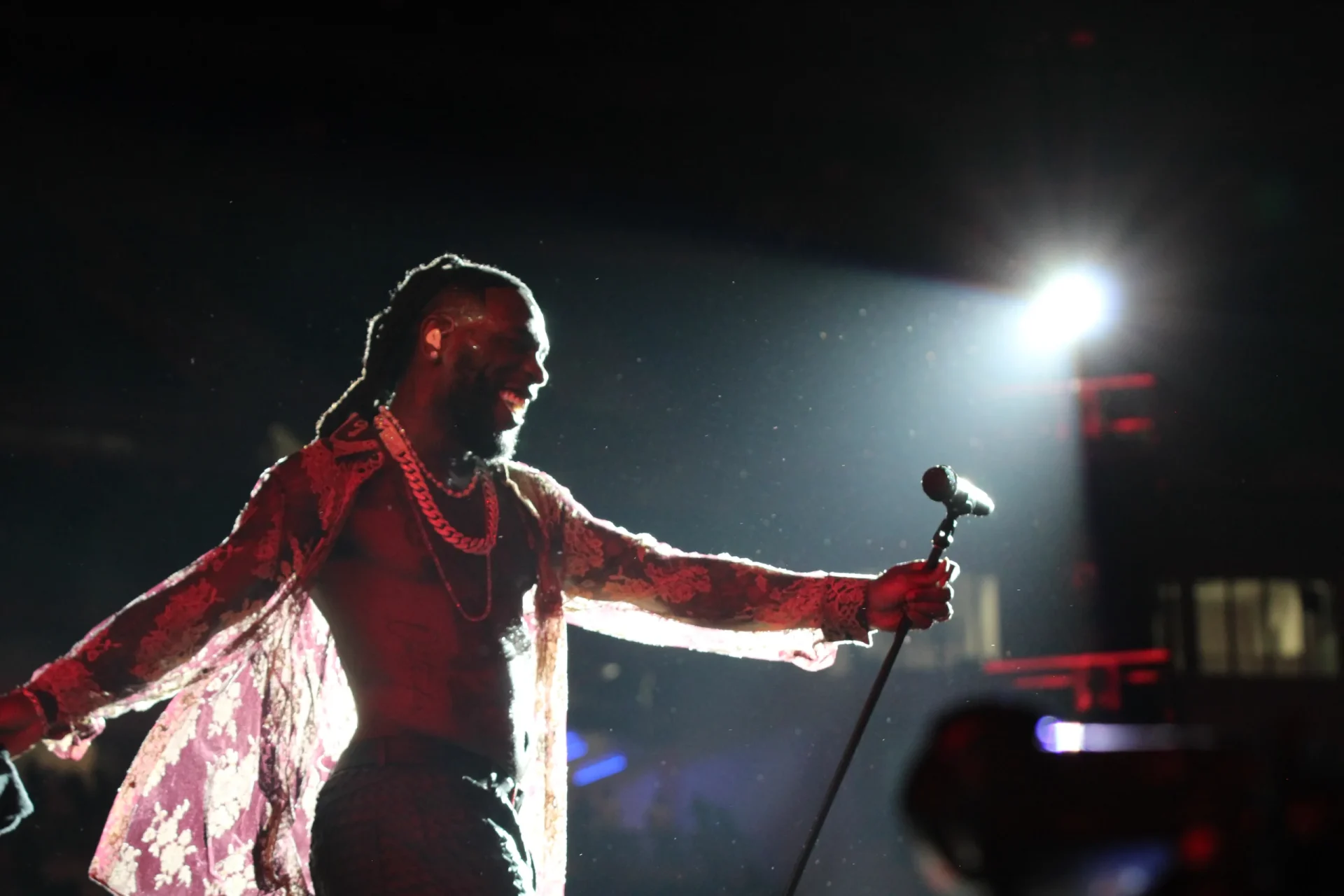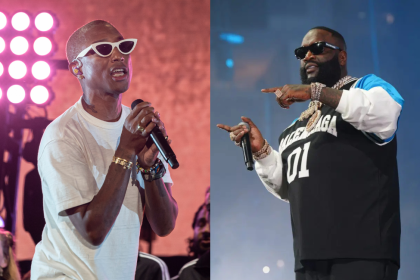A seismic shift in global music representation reached a historic pinnacle when Grammy-winning superstar Burna Boy announced his groundbreaking achievement as the first Nigerian artist ever to headline Colorado’s legendary Red Rocks Amphitheatre. This momentous milestone extends far beyond a single concert booking, representing a cultural earthquake that’s reshaping how the world perceives and embraces African musical artistry.
The announcement of Burna Boy’s No Sign of Weakness Tour has sent ripples throughout the international music community, with industry insiders recognizing this moment as a defining chapter in the ongoing globalization of African sounds. What began as a regional movement has evolved into a worldwide phenomenon that’s forcing the music industry to completely reconsider its understanding of mainstream appeal and cultural influence.
Breaking barriers at America’s most iconic venue
Red Rocks Amphitheatre stands as more than just a concert venue – it represents the pinnacle of musical achievement in America. Carved into the natural rock formations of Morrison, Colorado, this legendary space has witnessed performances by The Beatles, U2, Johnny Cash and countless other icons who helped define popular music across generations.
For a Nigerian artist to claim headliner status at this sacred musical ground represents a breakthrough that reverberates far beyond entertainment. The venue’s natural acoustics and breathtaking scenery have provided the backdrop for some of music history’s most memorable moments, and Burna Boy’s November 12 performance will join that exclusive legacy.
The symbolic power of this achievement cannot be overstated. Red Rocks has long served as a benchmark for artistic credibility and commercial success in the American market. International artists who conquer this venue demonstrate their ability to connect with diverse audiences while maintaining their authentic cultural identity.
The venue’s selection committee typically reserves headlining slots for established superstars with proven track records of selling out major venues. Burna Boy’s booking represents their confidence in his ability to fill the amphitheater’s 9,525 seats while delivering a performance worthy of the venue’s prestigious reputation.
African music’s unstoppable global expansion
The transformation of African music from regional curiosity to global phenomenon has accelerated dramatically over the past decade. What started with isolated breakthrough moments has evolved into a sustained movement that’s fundamentally altering the international music landscape.
Streaming platforms have played a crucial role in this evolution, providing African artists with direct access to global audiences without relying on traditional gatekeepers. Burna Boy’s over 1 billion streams on Spotify alone demonstrate the massive appetite for African musical expressions that transcends geographical and cultural boundaries.
The success extends beyond individual artists to encompass entire genres and regional scenes. Afrobeats, Amapiano, Highlife and other African musical styles are now recognized as distinct categories with dedicated playlists, radio programming and festival representation worldwide.
This global expansion has created unprecedented opportunities for cultural exchange and understanding. Audiences worldwide are discovering the rich musical traditions of Africa while contemporary African artists are incorporating international influences to create innovative fusion sounds that appeal to diverse listeners.
Cultural diplomacy through musical excellence
Burna Boy’s international success functions as a form of cultural diplomacy that’s reshaping global perceptions of Africa and its contributions to world culture. His music serves as an ambassador for Nigerian creativity, showcasing the sophistication and innovation emerging from African artistic communities.
The impact extends beyond entertainment to influence fashion, language, dance and lifestyle trends worldwide. Young people across continents are embracing African cultural expressions through music, creating connections that transcend traditional boundaries and stereotypes.
This cultural influence challenges historical narratives that have often marginalized African contributions to global culture. Through commercial success and critical acclaim, artists like Burna Boy are demonstrating that African creativity deserves equal recognition and respect on the world stage.
The educational component of this cultural exchange cannot be ignored. Fans who discover African music through mainstream channels often develop deeper interests in African history, politics and social issues, creating more informed and engaged global citizens.
Industry recognition validates artistic merit
The music industry’s embrace of African artists represents more than trendy marketing – it reflects genuine recognition of artistic excellence and commercial viability. Major record labels, booking agencies and media outlets are investing significant resources in developing and promoting African talent.
Award ceremonies have expanded their recognition of African artists, with Grammy categories now acknowledging Afrobeats and other African genres. This institutional validation provides legitimacy that opens doors for additional artists and creates sustainable career paths within the global music industry.
Collaboration opportunities between African and international artists have multiplied exponentially, creating cross-cultural musical expressions that introduce African sounds to new audiences while providing African artists with expanded creative possibilities.
The festival circuit has similarly embraced African representation, with major events worldwide featuring African artists as headliners rather than curiosities. This mainstream positioning demonstrates confidence in these artists’ ability to draw crowds and deliver memorable performances.
Economic impact transforms creative industries
The global success of African music has generated substantial economic benefits that extend throughout creative industries and local communities. Successful artists like Burna Boy create employment opportunities for producers, managers, tour personnel and countless others who support international music careers.
Tourism benefits have emerged as fans travel to experience African music in its original cultural contexts. Nigeria, Ghana, South Africa and other countries are seeing increased visitor interest motivated by musical discoveries, creating new revenue streams for local economies.
The fashion and lifestyle industries have similarly benefited from increased global interest in African culture. Designers, brands and influencers are finding new markets and opportunities as African aesthetics gain mainstream acceptance worldwide.
Investment in African music infrastructure has accelerated as international companies recognize the commercial potential of African markets and talent. Recording studios, distribution networks and management companies are expanding their presence across the continent.
Breaking down barriers for future generations
Burna Boy’s achievement at Red Rocks creates pathways for countless other African artists who previously faced insurmountable barriers to international success. His success demonstrates that African artists can compete at the highest levels while maintaining their cultural authenticity.
Young African musicians now have concrete examples of international success that inspire their own artistic ambitions. The visibility of African artists on global stages encourages the next generation to pursue professional music careers with confidence in their potential for worldwide recognition.
Educational institutions are beginning to recognize and study African musical traditions with the same seriousness previously reserved for Western classical and popular music. This academic validation provides additional legitimacy and creates formal learning opportunities for aspiring musicians.
Music industry infrastructure across Africa is developing rapidly as international success creates demand for professional services, equipment and facilities that support world-class artistic production.
Technological revolution enables global reach
Digital platforms have democratized music distribution in ways that particularly benefit African artists who previously struggled to access international markets through traditional channels. Streaming services, social media and digital marketing tools provide direct connections between African artists and global audiences.
The viral nature of contemporary music discovery has created opportunities for African songs to achieve international success without conventional industry support. Dance challenges, social media trends and user-generated content have introduced African music to millions of new listeners worldwide.
Collaboration technology enables African artists to work with international producers and musicians without geographical constraints, creating fusion sounds that might not have been possible in previous eras.
The data analytics available through digital platforms provide African artists with detailed insights into their global audience demographics, helping them make informed decisions about touring, marketing and artistic direction.
Future implications for global music culture
Burna Boy’s Red Rocks achievement represents just the beginning of what appears to be a fundamental shift in global music culture. As African artists continue gaining international recognition and commercial success, their influence on worldwide musical trends will likely expand exponentially.
The integration of African musical elements into mainstream popular music is already evident across genres, from pop and hip-hop to electronic and rock music. This cross-pollination creates new sounds that reflect our increasingly connected global culture.
Language barriers continue dissolving as audiences embrace music in languages they don’t understand, focusing instead on emotional connection, rhythm and artistic expression. This trend particularly benefits African artists who often perform in indigenous languages alongside English.
The success of African music is inspiring similar recognition for other previously marginalized musical traditions worldwide, creating a more diverse and inclusive global music landscape that celebrates cultural differences while finding common ground through artistic expression.












